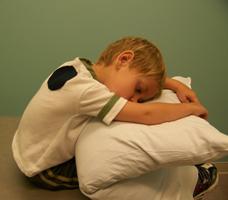What is Chest Physiotherapy (CPT) for Children?
The lungs make mucus to help defend against germs. Cystic fibrosis (CF) changes the mucus, making it thick and hard to clear. This mucus is where infections can occur. Infections cause inflammation or swelling of the lungs. Both infections and inflammation cause more mucus to be made. More mucus in the lungs can lead to more infections. This cycle of infection, inflammation and more mucus can hurt the lungs and lower lung function.

How does CPT work?
Brisk percussion of the chest wall helps to break up and dislodge mucus, so it can be more easily huffed or coughed out of the body.
How do you perform CPT?
- Place your child in different positions so that mucus can be more easily moved (see pictures below).
- Percuss different areas of the chest wall to help loosen and move the mucus toward the center of the chest.
- Percuss for two minutes in each different position.
- If your child is old enough, have them huff / cough between each position.
- Repeat until all different positions are complete.
Tips for Percussion
- Put a thin layer of clothing, such a T-shirt, on your child’s chest.
- Use a cupped hand or percussor cup. If done right, you will hear a popping sound. Percussion should not cause red marks on your child.
- Do not percuss over the backbone, breastbone, or lower two ribs.
- Do CPT before meals or 30 minutes after meals.
- Percuss on both the right and left sides.
- Your child should get two treatments daily and increase to three or four when sick.
Positioning Your Child for Percussion
A respiratory therapist (RT) will show you how to do percussion. Do percussion on both right and left sides. If you have any questions, ask your child’s RT.
*** Percuss over the areas with black circles ***
Sitting position, slightly leaning back
Percuss over shoulders on both side

Sitting position, slightly leaning forward
Percuss over shoulder blades on both sides

Lying flat on back
Percuss between shoulders and nipple on each side

On side, slightly tilted back
Percuss over nipple area or just below breast in females, on both sides

Lying on side
Percuss over lower ribs on both sides

Lying on side, whole body rolled slightly forward
Percuss over middle portion of the rib cage on both sides

Lying flat on stomach
Percuss over middle back on both sides

Lying flat on stomach
Percuss over lower back on both sides




